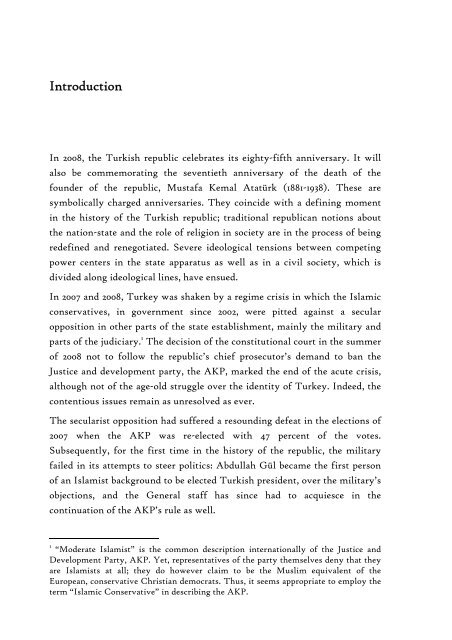2008_10_SRP_CornellKaraveli_Turkey
2008_10_SRP_CornellKaraveli_Turkey
2008_10_SRP_CornellKaraveli_Turkey
You also want an ePaper? Increase the reach of your titles
YUMPU automatically turns print PDFs into web optimized ePapers that Google loves.
Introduction<br />
In <strong>2008</strong>, the Turkish republic celebrates its eighty-fifth anniversary. It will<br />
also be commemorating the seventieth anniversary of the death of the<br />
founder of the republic, Mustafa Kemal Atatürk (1881-1938). These are<br />
symbolically charged anniversaries. They coincide with a defining moment<br />
in the history of the Turkish republic; traditional republican notions about<br />
the nation-state and the role of religion in society are in the process of being<br />
redefined and renegotiated. Severe ideological tensions between competing<br />
power centers in the state apparatus as well as in a civil society, which is<br />
divided along ideological lines, have ensued.<br />
In 2007 and <strong>2008</strong>, <strong>Turkey</strong> was shaken by a regime crisis in which the Islamic<br />
conservatives, in government since 2002, were pitted against a secular<br />
opposition in other parts of the state establishment, mainly the military and<br />
parts of the judiciary. 1 The decision of the constitutional court in the summer<br />
of <strong>2008</strong> not to follow the republic’s chief prosecutor’s demand to ban the<br />
Justice and development party, the AKP, marked the end of the acute crisis,<br />
although not of the age-old struggle over the identity of <strong>Turkey</strong>. Indeed, the<br />
contentious issues remain as unresolved as ever.<br />
The secularist opposition had suffered a resounding defeat in the elections of<br />
2007 when the AKP was re-elected with 47 percent of the votes.<br />
Subsequently, for the first time in the history of the republic, the military<br />
failed in its attempts to steer politics: Abdullah Gül became the first person<br />
of an Islamist background to be elected Turkish president, over the military’s<br />
objections, and the General staff has since had to acquiesce in the<br />
continuation of the AKP’s rule as well.<br />
1<br />
“Moderate Islamist” is the common description internationally of the Justice and<br />
Development Party, AKP. Yet, representatives of the party themselves deny that they<br />
are Islamists at all; they do however claim to be the Muslim equivalent of the<br />
European, conservative Christian democrats. Thus, it seems appropriate to employ the<br />
term “Islamic Conservative” in describing the AKP.


